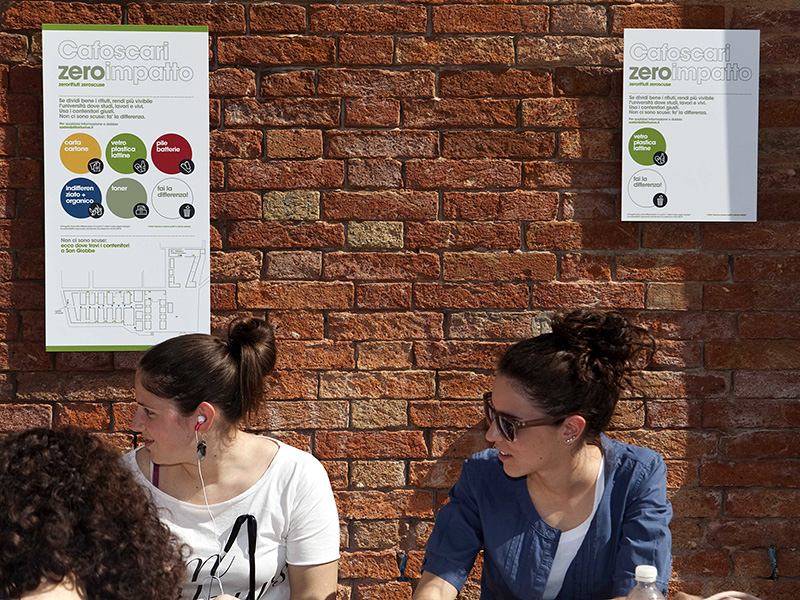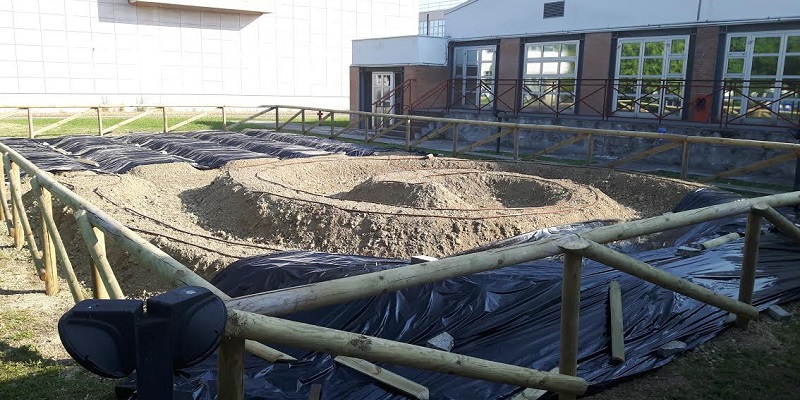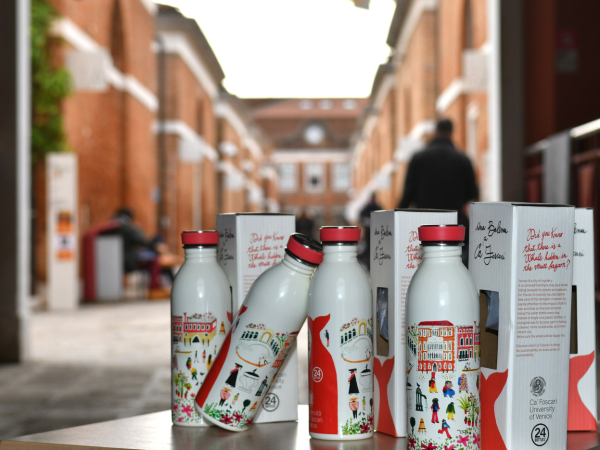Environment and Climate Change

In the last years, Ca' Foscari undertakes to improve energy and water management and to reduce environmental university impact, safeguarding the delicate ecosystem to which Ca' Foscari belong. In the following, the actions developed in the fields of mobility, environmental performances, environmental certifications and waste are listed.
What can you do to help?
Promptly report any faults or malfunctions.
If you work at Ca' Foscari, you can contact the venue’s contact person[ITA] directly.
Indicate:
- The type of fault
- The location of the fault
If no venue’s contact person is available:
- University guardian
- Campus guardianship staff
- Colleagues in the Building Management Office
If you study at Ca' Foscari and have noticed faults or malfunctions, you can promptly notify the on-site staff (the venue’s contact person or the front desk) who will notify the appropriate staff.

Managing the University’s carbon emissions
Since 2010, the University has been assessing and quantifying its carbon footprint and determining the main emission sources and processes involved. From 2010 to 2014, this process was developed thanks to the "Carbon Management" project, where Ca' Foscari pioneered as the first Italian university to launch a carbon footprint quantification project. In December 2018, the publication of the "2018-2020 University Plan for the Reduction of Carbon Emission" set specific targets for the reduction of carbon emissions.
In 2022, the University drafted the "Climate Change Mitigation and Adaptation Plan", proposing a set of actions and a realistic programme for the progressive reduction of the University's carbon footprint, with the ambition of achieving carbon neutrality by 2050 while increasing its resilience to major climate stressors.
Water resource use and quality
The University has set up concrete actions for sustainable water management, involving the student community and staff.
In 2022, the University published its Piano di Mitigazione e Adattamento ai Cambiamenti Climatici, which contains a number of actions dedicated specifically to water resource management, including water footprint calculations, a rainwater harvesting system, and communication and awareness actions for the university community.
Buildings
In recent years Ca’ Foscari has been engaged in the renovation of its buildings, with works that have substantially altered their original characteristics.
In fact, additional spaces have been freed up for functional use, while new buildings and university complexes have been designed to cater for the needs for extra space due to the growing numbers of students, at the same time guaranteeing the right conditions for top quality research with more equipment and instruments, and in a safe environment.
The University has concentrated its construction activities to those areas of the city and mainland area with great potential, the aim being to regenerate and revitalise these, whilst always bearing in mind the delicate Venetian ecosystem.
LEED certification at Ca' Foscari
LEED® is an energy and sustainability certification standard: a set of criteria for the design, construction and management of buildings that are sustainable from an environmental, social, economic and health perspective. The certification is awarded by assigning a score depending on the achievement of measurable requirements - from energy consumption to indoor environment quality - that define the level of environmental impact of buildings in the various areas of sustainability.
Ca' Foscari has obtained the LEED certification for its headquarters, Palazzo Foscari, a late-Gothic building dating back to 1453: one of the oldest in the world holding this certification. The certification was obtained in 2013 (Certified level), renewed in 2018 (Silver level) and in 2025 (Gold level).
The new Scientific Campus building, Epsilon, has obtained, in 2025, the LEED Gold certification, thanks to its sustainability features.
Recycling
The recycling in Ca' Foscari has been launched in 2010 in the main building and in San Giobbe Campus, through the "Ra.Di.Ca. - Raccolta Differenziata a Ca' Foscari" project, in collaboration with VERITAS SpA.
In 2011, the project has been extended, to all the other university buildings in Venice, Mestre and Treviso.
In the correct waste management there are two complementary goals:
- to improve the recycling system in the university buildings and the following process of requalification;
- to promote and give value to sustainable behaviours in the university community, especially in daily behaviour, such as the waste production and its differentiation, the purchase and the conscious use of goods and resources.
To efficiently respond to students and staff expectations, solutions are implemented and integrated with the activities of the cleaning and concierge service company.
Awareness initiatives for students and staff are included in the activities. For exemple the partecipation to the European Week for Waste Reduction, staff training for the Cleaning Company on university waste collection procedure and all the activities that engage students in a direct way.
Leonilde Ferrazzo
leonilde.ferrazzo@unive.it

Ca' Foscari "plastic-free"
Since September 2019 Ca’ Foscari University has adopted many plastic-free initiatives. First of all, metal water bottles have been given to all the university community and the number of water cooler has been increased in many university’s buildings.
Secondly, water plastic bottles and glasses have been replaced by glass jugs and glasses in every institutional meeting and conference.
Thirdly, also the catering service of the university is more sustainable. In fact, Ca’ Foscari University has concluded an agreement with its service providers in order to prevent the use of any kind of single-use plastic object. Moreover, different types of food are available in the catering service such as vegetarian food, biological food, fair trade and 0km food.
Lastly, plastic glasses and scoops have been replaced with compostable material stuff in coffee machines present in Ca’ Foscari’s buildings and it is possible to choose the “no glass” option so people can use their personal cups.
Supply chain
Like all Public Administrations, Ca’ Foscari University makes most of its purchases through Consip (Authority for Public IT) and MePA (Italian Public Administration e-Marketplace) the procurement platform managed by Consip. Consip is a joint-stock company set up by the Italian Ministry of Economy and Finance as a Central Purchasing Body, which develops innovative purchase procedures and tools (agreements, e-Marketplace, framework agreements) for administrations and companies. Under a series of specific agreements, it provides the single administrations with support throughout the procurement process.
The Italian Public Administration e-Marketplace, or MePA, guarantees Public Administrations, transparency and traceability in every step of the procurement process, allowing them to compare products offered by suppliers throughout Italy and giving PAs the opportunity to make requests for quotations.
Green Public Procurement
Ca' Foscari has been collaborating for years with the Veneto Region to share good practices related to GPP. In particular, in 2019 this collaboration was formalized with the memorandum of understanding on GPP that involves, in addition to the Region and Ca' Foscari, all universities in the Veneto region, the Chamber of Commerce, and ARPAV. The goal is to open a permanent table for the modification of CAM - Minimum Environmental Criteria and the sharing of good practices among organizations and institutions.
In 2015 the University set up a specific project entitled “Green Public Procurement (GPP). Restraints and opportunities for business and public administrations” in collaboration with the Fondazione Ca’ Foscari and thanks to funding from the local Chamber of Trade (Camera di Commercio Venezia Rovigo Delta Lagunare).
The purpose of this project was to spread the culture of corporate social accountability within both public administrations and local businesses, using Ca’ Foscari’s Central Administration as a case study.
Green Purchases
Green Purchases or GPP - Green Public Procurement is a process whereby public authorities seek to procure goods, services and works with a reduce environmental impact throughout their life cycle when compared to goods, services and works with the same primary function that would otherwise be procured.
Sustainable transports
Ca’ Foscari is committed to promoting the sustainable mobility and a low environmental impact through a series of conventions dedicated to personnel, for travels to and from work.
The University adheres to the initiatives promoted by the mobility manager of the area focused on promoting the use of local public transports. The mobility manager of the provincial area of Venice has stipulated a conversation with the operators providing local public transport in the Venetian area to sell annual subscriptions for firms adhering to the mobility management initiatives.
The Venetian Firm for Mobility S.p.A (AVM) has made the places within Mestre’s Bicycle Park available to university employees so that they can park their car for a charge and safely ride a bike for a reduced price.
Besides this, the university has stipulated a convention with the cooperative that manages the Bike Park with the purpose to offer a service of bike reparation and maintenance for users and the possibility to buy a new bike at discounted prices.
Bike sharing at the Scientific Campus
In 2016 the new bike sharing station of Via Torino was inaugurated at the entrance of the Scientific Campus.
The venue created by the collaboration between the University and the City of Venice creates a system of links between the railway station of Mestre and the university campus, in the name of sustainable mobility. Bike sharing can help to achieve this by using the following services:
- accessibility: ease enrollment and use;
- affordability: low rates, with free use for the first hour;
- flexibility: no reservation obligation;
- capillarity of the service: there are 19 cycling stations located on the municipal territory, to move easily from one point to the other in the city in extreme autonomy.
This is an automated, 24-hour bicycle rental service that provides bicycles, located at the city's strategic points, which the user can take at any time, without booking, using the the IMOB / Venezia UNICA membership card, which is enabled after registration.
Green Areas
Ca' Foscari University of Venice has about 15.000 m2 of green areas, divided into gardens of various sizes, shrubberies and outside areas. The University also owns about 90 big trees, all of which are catalogued.
Furthermore, in the interests of sustainability, the University aimed its efforts towards the realization of plans and technical practices with a low environmental impact.
The University has then opted for lawns with grass that can be walked on, which require less water and where what gets mowed can stay where it is and become organic matter. At the same time, pruning clippings are ground up and delivered back to the soil, without any kind of waste.
Drip irrigation limits water usage without posing any danger for the plant.
Lastly, Ca' Foscari is trying to avoid synthetic pesticides and fungicides completely, in favor of organic substitutes.

Last update: 21/05/2025


